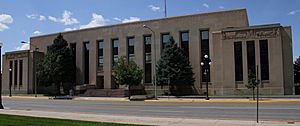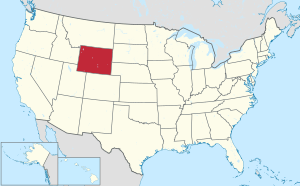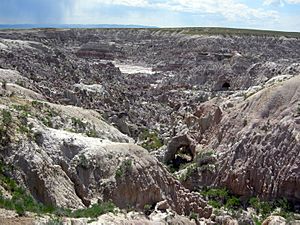Natrona County, Wyoming facts for kids
Quick facts for kids
Natrona County
|
||
|---|---|---|

Natrona County Courthouse in Casper
|
||
|
||

Location within the U.S. state of Wyoming
|
||
 Wyoming's location within the U.S. |
||
| Country | ||
| State | ||
| Named for | Natron deposits | |
| Seat | Casper | |
| Largest city | Casper | |
| Area | ||
| • Total | 5,376 sq mi (13,920 km2) | |
| • Land | 5,340 sq mi (13,800 km2) | |
| • Water | 35 sq mi (90 km2) 0.7%% | |
| Population
(2020)
|
||
| • Total | 79,955 | |
| • Density | 14.8726/sq mi (5.7423/km2) | |
| Time zone | UTC−7 (Mountain) | |
| • Summer (DST) | UTC−6 (MDT) | |
| Congressional district | At-large | |
Natrona County is a county in the U.S. state of Wyoming. As of the 2020 United States Census, the population was 79,955, making it the second-most populous county in Wyoming. Its county seat is Casper.
Natrona County comprises the Casper, WY Metropolitan Statistical Area. In 2010, the center of population of Wyoming was in Natrona County, near Alcova.
Contents
History
Prior to Wyoming's settlement by European-based populations, the area's stretches played host to nomadic tribes such as Cheyenne, Arapaho, Shoshone, and Sioux.
New York investor John Jacob Astor established the settlement of Astoria on the Columbia River, and sent Robert Stuart eastward to blaze a trail and lay the foundation of a string of trading posts. Stuart documented the South Pass Route through the Continental Divide, near the SW corner of present-day Natrona County. Stuart's company erected the first hut in the area in 1812, near present-day Bessemer Bend.
In 1840, Father Pierre-Jean De Smet began preaching the Christian teaching to this area's indigenous peoples. He carved his name on Independence Rock and called it The Register of the Desert. Later explorers who inscribed the rock include John C. Frémont (1843), who explored the country along the Platte and Sweetwater Rivers.
The first Euro-American settlement occurred in the Casper area in the late 19th century. Natrona County was created by the legislature of the Wyoming Territory on March 9, 1888, and it was organized in 1890. The land for Natrona County was annexed from Carbon County.
Natrona County was named for the deposits of natron found in the area. According to George Mitchell, first mayor of Casper and member of the organization commission for Natrona County, the name was first suggested "by my old friend the late Cy Iba, who at one time owned the soda lakes." In 1909, Natrona County gained land from Fremont County. The boundaries were adjusted slightly in 1911 and 1931, and at that point the county gained its present outline.
Geography

According to the U.S. Census Bureau, the county has an area of 5,376 square miles (13,920 km2), of which 5,340 square miles (13,800 km2) is land and 35 square miles (91 km2) (0.7%) is water.
Geographic features
Adjacent counties
- Johnson County – north
- Converse County – east
- Albany County – southeast
- Carbon County – south
- Fremont County – west
- Washakie County – northwest
Major highways
 Interstate 25
Interstate 25 I-25 Bus.
I-25 Bus. U.S. Highway 20
U.S. Highway 20 U.S. Highway 26
U.S. Highway 26 U.S. Highway 87
U.S. Highway 87 U.S. Highway 287
U.S. Highway 287 Wyoming Highway 220
Wyoming Highway 220 Wyoming Highway 251
Wyoming Highway 251 Wyoming Highway 252
Wyoming Highway 252 Wyoming Highway 253
Wyoming Highway 253 Wyoming Highway 256
Wyoming Highway 256 Wyoming Highway 257
Wyoming Highway 257 Wyoming Highway 258
Wyoming Highway 258 Wyoming Highway 259
Wyoming Highway 259 Wyoming Highway 387
Wyoming Highway 387 Wyoming Highway 487
Wyoming Highway 487
Transit
- Casper Area Transit
- Express Arrow
Geology
Natrona County derives its name from the vast deposits of the mineral Natron found within the county. Of the 18 million tons of Natron consumed by American industry annually 17 Million tons is mined in Wyoming due to it purity.
National protected areas
- Medicine Bow National Forest (part)
- Pathfinder National Wildlife Refuge (part)
Demographics
| Historical population | |||
|---|---|---|---|
| Census | Pop. | %± | |
| 1890 | 1,094 | — | |
| 1900 | 1,785 | 63.2% | |
| 1910 | 4,766 | 167.0% | |
| 1920 | 14,635 | 207.1% | |
| 1930 | 24,272 | 65.8% | |
| 1940 | 23,858 | −1.7% | |
| 1950 | 31,437 | 31.8% | |
| 1960 | 49,623 | 57.8% | |
| 1970 | 51,264 | 3.3% | |
| 1980 | 71,856 | 40.2% | |
| 1990 | 61,226 | −14.8% | |
| 2000 | 66,533 | 8.7% | |
| 2010 | 75,450 | 13.4% | |
| 2020 | 79,955 | 6.0% | |
| 2023 (est.) | 79,941 | 6.0% | |
| US Decennial Census 1870–2000 2010–2020 |
|||
2010 census
As of the 2010 United States Census, there were 75,450 people, 30,616 households, and 19,714 families in the county. The population density was 14.1 people per square mile (5.4 people/km2). There were 33,807 housing units at an average density of 6.3 units per square mile (2.4 units/km2). The racial makeup of the county was 92.8% white, 1.0% American Indian, 0.9% black or African American, 0.7% Asian, 0.1% Pacific islander, 2.2% from other races, and 2.4% from two or more races. Those of Hispanic or Latino origin made up 6.9% of the population. In terms of ancestry, 27.2% were German, 15.2% were Irish, 13.2% were English, and 10.7% were American.
Of the 30,616 households, 31.9% had children under the age of 18 living with them, 48.1% were married couples living together, 10.9% had a female householder with no husband present, 35.6% were non-families, and 28.5% of all households were made up of individuals. The average household size was 2.41 and the average family size was 2.94. The median age was 36.8 years.
The median income for a household in the county was $50,936 and the median income for a family was $62,859. Males had a median income of $47,610 versus $30,664 for females. The per capita income for the county was $28,235. About 5.4% of families and 8.4% of the population were below the poverty line, including 9.9% of those under age 18 and 8.8% of those age 65 or over.
Communities
Cities
- Casper (county seat and largest municipality)
Towns
Unincorporated areas
Census-designated places
Other communities
Education
Natrona County School District Number 1 is the school district for the entire county.
See also
 In Spanish: Condado de Natrona para niños
In Spanish: Condado de Natrona para niños


